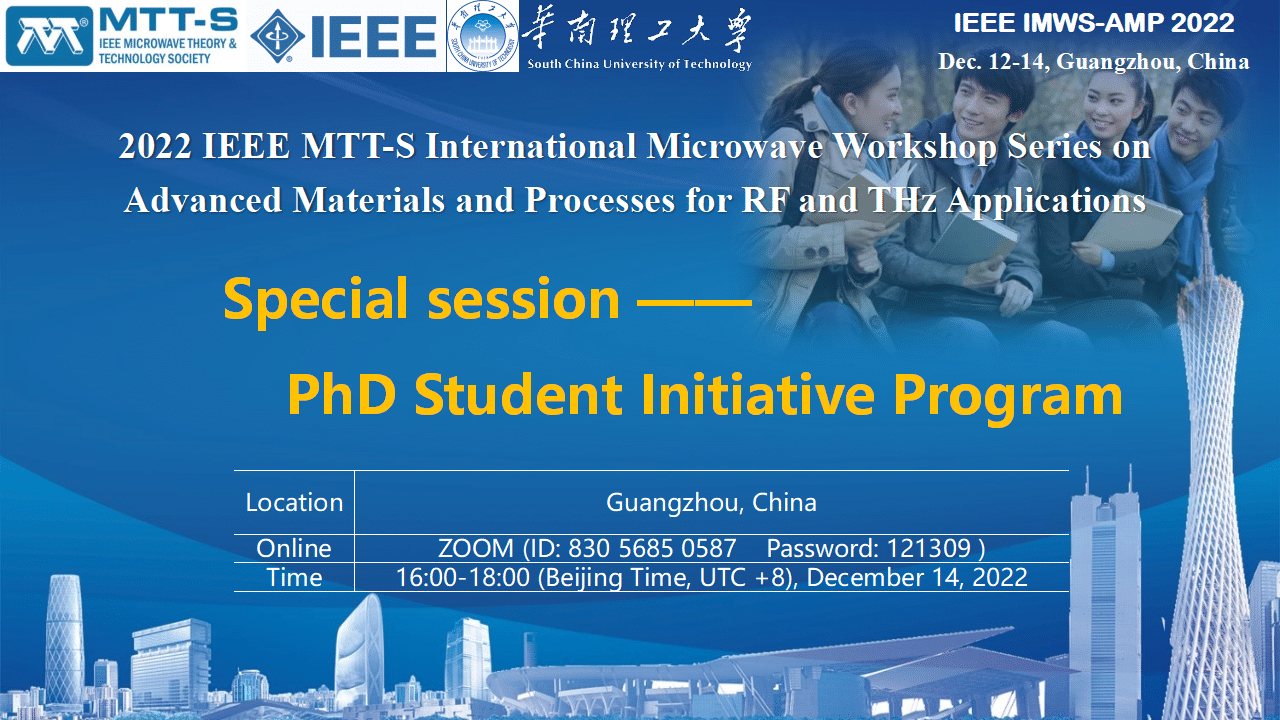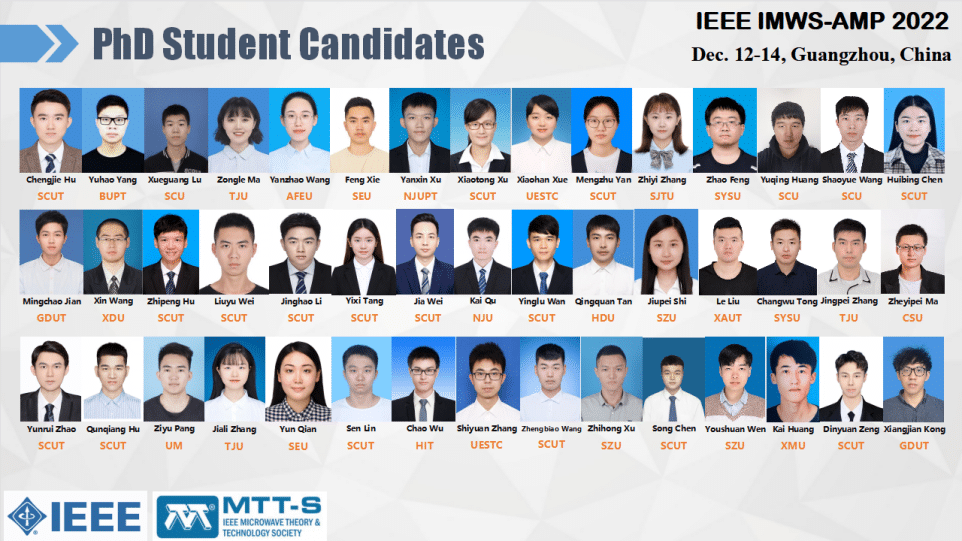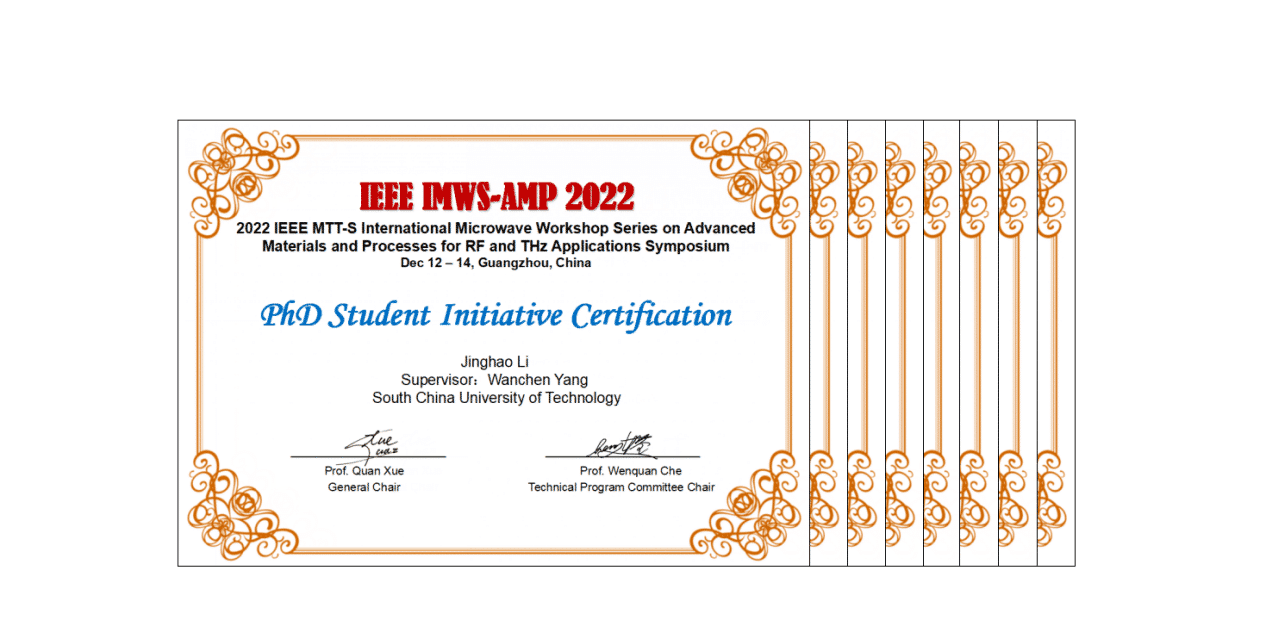PhD Student Initiative Program in IMWS-AMP 2022
How to Achieve High-quality Researches?
Wanchen Yang, Sheng Sun, Wenquan Che, Jinghao Li
The 2022 IEEE MTT-S International Microwave Workshop Series on Advanced Materials and Processes for RF and THz Applications (namely IMWS-AMP2022) was held in Guangzhou, China, on 12-14 Dec. 2022. Due to the continuous impact of Corvid-19 pandemic, only one small-size onsite opening and closing ceremony were organized in Guangzhou, while all the conference sessions were unfortunately held online. Along with IMWS-AMP2022, aiming to encourage early-stage PhD students and provide them precious opportunities to meet senior professionals in field of RF and Microwave, the PhD Student Initiative Program was organized and held in the afternoon of 14 December, 2022. This program is financially sponsored by IEEE MTT-S Education Committee. After the selection by the Student Activity Subcommittee under Award Committee, 45 PhD students in the preliminary stage of their research work (without any paper at IMWS-AMP 2022) from 20 universities in China were chosen to participate in this session. The registration fee for them was paid from the sponsoring budget of Education Committee. All the selected attendees were allowed to participate all the events of the conference.

Fig.1 A promotion flyer of the PhD Student Initiative Program in IMWS-AMP 2022

Fig.2 A group photo of attendees at the PhD Student Initiative Program in IMWS-AMP 2022
This session was co-organized by Prof. Wanchen Yang and Prof. Sheng Sun, included an opening speech, seven oral presentations and one panel discussion. Firstly, Prof. Sun introduced the motivation of this event, the agenda of this session, and also welcomed the three internationally renowned invited speakers, including Prof. Quan Xue, who is IEEE Fellow and the member of the National 6G Technology General Expert Group, and Prof. Ming Yu, who is IEEE Fellow and Fellow of the Canadian Academy of Engineering, and Prof. Kaixue Ma, who is the Dean of the School of Microelectronics, Tianjin University.
The 45 PhD students were divided into 7 groups in advance, covering antenna, circuit and new materials applications. In the session, the 7 groups presented oral talks respectively to share the insights and interesting researches observed in the conference. The group of antenna mainly discussed the application of metasurface structure in antenna, which can realize high gain and low profile, as well as light weight if accommodated on the satellite. Then, the group of circuit mentioned the main challenge of CMOS transceiver is low output power and high noise figure, and then the multi-functional millimeter-wave circuit is one very research topic. At last, the group of new materials application shared the extensive use of phase change materials in multi-functional systems, as well as the current topical issue, reconfigurable intelligent surface.

(a)
 (b) (c) (d)
(b) (c) (d)
Fig. 3 (a) The topics of the panel discussion and the three panelists. (b) Prof. Quan Xue (c) Prof. Ming Yu (d) Prof. Kaixue Ma.
In the panel session, the three invited panelists answered the students’ questions and shared their experiences about how to achieve high-quality researches during the doctoral period. Prof. Xue focused that although there would be various difficulties during the PhD study, we should bear big pressures, read more papers, do more simulations and experiments, and think more to complete creative work. Inview of the balance between the quality and quantity of papers, Prof. Yu pointed out that the publication of papers is a result rather than a goal, and efforts should be focused on the novelty and creativity. Meanwhile, Prof. Yu proposed three rules, which can be summarized as “Good thing is simple“, “There is no free lunch” and “Think critically“. Finally, focused on the development tendency of RF devices, Prof. Ma’s views can be summarized into six points, namely, multi-layer process, multi-function, multi-platform integration, multi process, new materials, and new technology. Besides, with the upgrading of communication technology, the number of RF devices will become very large in the future, and the employment prospects of the RF industry will be very broad.
At last, Prof. Sun gave one concluding remark. He mentioned that although it takes a lot of effort to complete the PhD program, as long as you can stick to it, you will gain much more than your pay. Through this PhD Student Initiative Program, many valuable viewpoints were generated and discussed, which could finally fulfill the vision of facilitating these PhD students in transitioning to niche topics and complete high-quality researches. To bear good memories, one program certificate with the name is prepared for each student.

Fig.4 The certificates of the PhD Student Initiative Program
Author information:
Wanchen Yang (wcyang@hhu.edu.cn) is with the Hohai University, Nanjing, China.
Sheng Sun (sunsheng@uestc.edu.cn) is with the University of Electronic Science and Technology of China, Chengdu, China.
Wenquan Che (eewqche@scut.edu.cn) is with the South China University of Technology, Guangzhou, China.
Jinghao Li (eeljh@mail.scut.edu.cn) is with the South China University of Technology, Guangzhou, China.